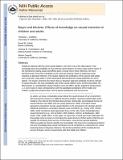Bayes and Blickets: Effects of Knowledge on Causal Induction in Children and Adults
Author(s)
Griffiths, Thomas L.; Sobel, David M.; Tenenbaum, Joshua B.; Gopnik, Alison
DownloadTenenbaum_Bayes and blickets.pdf (1.491Mb)
OPEN_ACCESS_POLICY
Open Access Policy
Creative Commons Attribution-Noncommercial-Share Alike
Terms of use
Metadata
Show full item recordAbstract
People are adept at inferring novel causal relations, even from only a few observations. Prior knowledge about the probability of encountering causal relations of various types and the nature of the mechanisms relating causes and effects plays a crucial role in these inferences. We test a formal account of how this knowledge can be used and acquired, based on analyzing causal induction as Bayesian inference. Five studies explored the predictions of this account with adults and 4-year-olds, using tasks in which participants learned about the causal properties of a set of objects. The studies varied the two factors that our Bayesian approach predicted should be relevant to causal induction: the prior probability with which causal relations exist, and the assumption of a deterministic or a probabilistic relation between cause and effect. Adults’ judgments (Experiments 1, 2, and 4) were in close correspondence with the quantitative predictions of the model, and children’s judgments (Experiments 3 and 5) agreed qualitatively with this account.
Date issued
2011-10Department
Massachusetts Institute of Technology. Department of Brain and Cognitive SciencesJournal
Cognitive Science
Publisher
Wiley Blackwell
Citation
Griffiths, Thomas L., David M. Sobel, Joshua B. Tenenbaum, and Alison Gopnik. “Bayes and Blickets: Effects of Knowledge on Causal Induction in Children and Adults.” Cognitive Science 35, no. 8 (October 4, 2011): 1407–1455.
Version: Author's final manuscript
ISSN
03640213
1551-6709